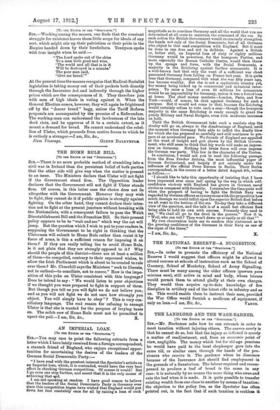AN IMPERIAL LOAN. [To THE EDITOR OP THE "Spzerszos."] Sia,—You
may care to print the following extracts from a letter which I have lately received from a foreign correspondent, a staunch friend of England, who enjoys exceptional oppor- tunities for ascertaining the desires of the leaders of the German Social Democratic Party :— " I have read with the greatest interest the Spectator's article on an Imperial loan, which, it is contended, would have the very best effect in checking German competition. Of course it would! But I go even one step further, and assert that it is the only means of achieving that %id.
I am not speaking at random. I have good reason to believe that the leaders of the Social Democratic Party in Germany ever since this competition began have wished that England would put down her foot resolutely once for all by raising a loan of such magnitude as to convince Germany and all the world that you are determined at all costs to maintain the command of the sea. By such action the British Government would enormously strengthen the hands not only of the Social Democrats, but of all Germans who object to this mad competition with England. But it must be done in one dose and not in driblets. Against a British or, better still, an Imperial loan of sixty or eighty millions Germany would be powerless, for the bourgeois Parties, and more especially the Roman Catholic Centre, would then throw up the sponge and form, with the Social Democrats, a majority in tho Reichstag against further armaments. It is a well-known fact that only the want of a sufficient war chest prevented Germany from falling on France last year. It is quite true that Germany, compared with what she was fifty years ago, has become wealthy. But she is not a capitalistic country yet, her money being locked up in commercial and industrial enter- prises. To raise a loan of even 50 millions for armaments would be an impossibility for Germany, unless it was a forced loan at home. The chief money markets—London, Paris, and New York—would, of course, be shut against Germany for such a purpose. But it would not come to that, because the Reichstag would certainly refuse to vote such a sum—though the bourgeois majority in the same Reichstag is ready enough to grant the yearly Military and Naval Budgets, even with moderate increases on both.
Until the British Government take such a resolute step the rivalry will go on, always to the disadvantage of England, until the moment when Germany feels able to inflict the deadly blow for which she has prepared so carefully and still continues to pre- pare at an accelerated pace. We friends of England are appalled at the want of insight and grit shown by the British Govern- ment, who still seem to think that big words will make an impres- sion on Germany. Nothing but brute force will ever impress the German war party. This lies in the character of the Teuton.
In conclusion, I would ask you to read the following passage from the Netts Zureher Zeitung, the most influential paper of German Switzerland, and largely if not entirely under the influence of the official Press Bureau in Berlin. Their Berlin correspondent, in the course of a letter dated August 4th, writes as follows :— I should like to take this opportunity of insisting that I have been impressed ever since last spring by the way in which self- confidence vis-a-vis with England has grown in German naval
circles as compared with formerly. I remember the time quite well
when the prospect of having to fight the British Navy was regarded by German officers as synonymous with the proposition how
much damage we could inflict upon the superior British fleet before
we all went to the bottom of the sea. To-day they take a different view of the question, and the talk is of a small but efficient fleet being able to hold its own with success. Formerly they used to say, " We shall all go to the devil in the process." Now it is, " Well, who can tell ? They won't down us so easily as all that My own observation leads me to confirm this statement as to the growing confidence of the Germans in their Navy as one of the signs of the times."






































 Previous page
Previous page